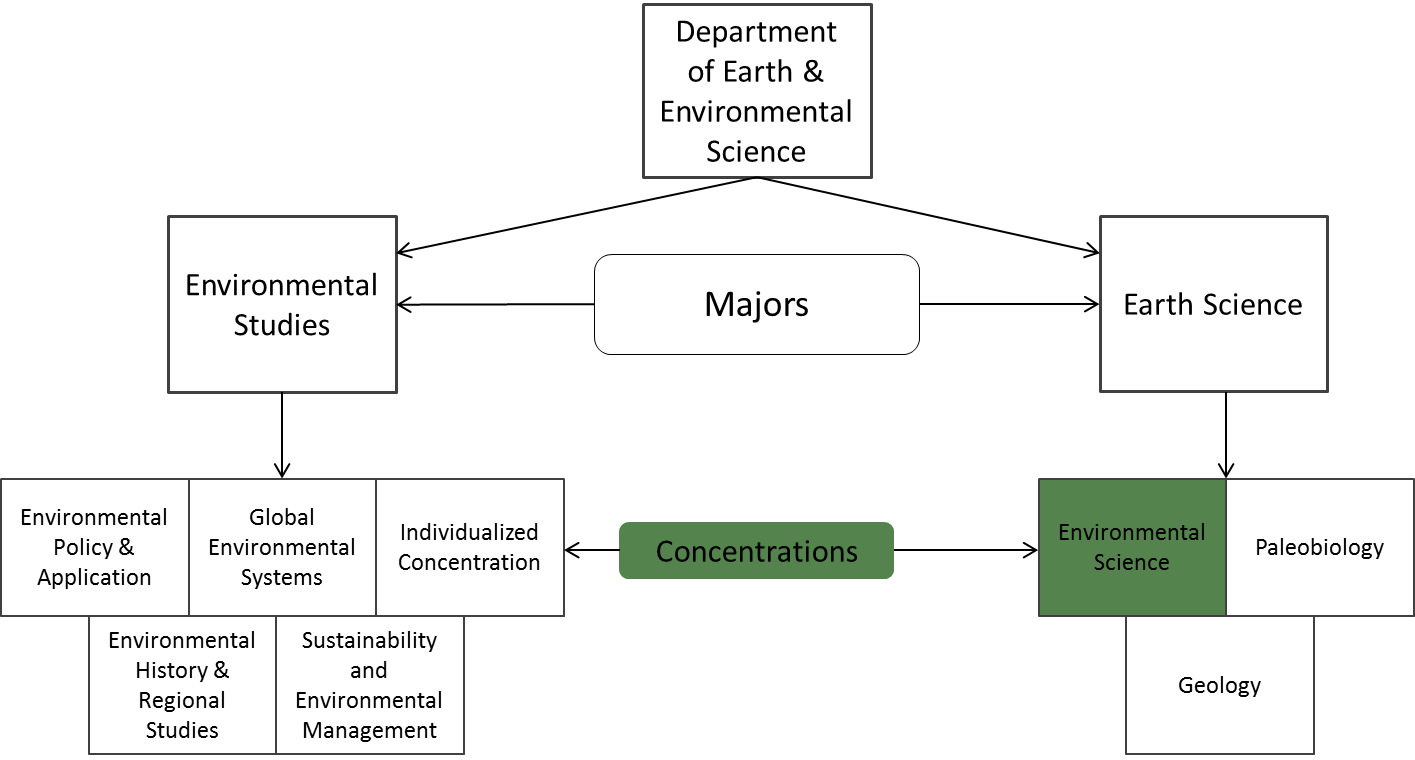
The Environmental Science concentration within the Earth Science major integrates geology, biology, chemistry, and physics in an effort to have students undertake a scientific study of the environment and the effects of humans on Earth systems. The concentration/major is made up 15 credits from several groups of courses outlined below.
(Minimum 15 credits for Major / 35 credits total)
ENVS and GEOL Core courses (2 CUs)
ENVS 100 / ENVS 1000: Introduction to Environmental Science (1 CU)
and one of the following courses:
ENVS 204 / EESC 2300: Global Climate Change (1 CU)
ENVS 301 / ENVS 3100: Environmental Case Studies (1 CU)
GEOL 100 / EESC 1000: Introduction to Geology (1 CU)
GEOL 103 / EESC 1060: Natural Disturbances and Disasters (1 CU)
GEOL 125 / EESC 1050: Earth and Life Through Time (1 CU)
GEOL 130 / EESC 1030: Oceanography (1 CU)
Math, Physics and Chemistry courses (3 CUs)
Preparation in chemistry, mathematics, biology and physics is essential for an Environmental Science Major, and courses in these subjects should be included in the first and second year of the program. Students must take three course units from the following list, with at least one course from two different groups (Math, Physics, Chemistry) (Note that 3 CU is the minimum requirement. More is certainly encouraged, and may be required for admission to graduate school. Please see your advisor for recommendations.)
Math:
MATH 104 / MATH 1400: Calculus, Part I (1 CU)
MATH 114 / MATH 1410: Calculus Part II (1 CU)
STAT 111 / STAT 1110: Introductory Statistics (1 CU)
Physics:
PHYS 0101/0150 or 0170 and corresponding lab: General Physics I (1.5 CU)
PHYS 0102/0151 or 0171 and corresponding lab: General Physics II (1.5 CU)
GEOL 420 / EESC 4800: Introduction to Geophysics (1 CU)
Chemistry:
CHEM 101 or CHEM 001 / CHEM 1011 and corresponding lab: Chemistry I (1.5 CU)
CHEM 102 or CHEM 002 / CHEM 1022 and corresponding lab: Chemistry II (1.5 CU)
GEOL 418 / EESC 4200: Geochemistry (1 CU)
Earth and Environmental Systems courses (5 CUs)
Students must take five course units from the pre-approved Earth and Environmental Systems course list.
At least 1 CU must be ENVS and at least 1 CU GEOL.
Living Systems courses (5 CUs)
Option 1:
BIOL 101 / BIOL 1101 Intro to Biology A lecture and lab (1.5 CU)
BIOL 102 / BIOL 1102 Intro to Biology B lecture and lab (1.5 CU)
BIOL 240: Ecology: from individuals to ecosystems (1 CU)
1 elective course from the pre-approved Living Systems course list.
Option 2:
BIOL 121 / BIOL 1121: Intro Bio-The Molecular Biology of Life (1 CU)
BIOL 240: Ecology: from individuals to ecosystems (1 CU)
3 elective courses from the pre-approved Living Systems course list.
Related Practical Experience (0 CU)
Each student is required to attend a summer Environmental Science Field Course or complete a similar curriculum-related practical experience. (No course units are attached to this requirement.)
Honors Requirements
(Minimum 19 credits for the major / 35 credits total)
Qualifying students preparing for graduate study in the environmental sciences should select the honors option. A senior thesis must be completed, a GPA of 3.25 in the major must be earned, and four additional CUs taken to achieve the Honors distinction in the major.
Students will follow the regular Environmental Science curriculum above, and in addition take:
2 CU from any of the following categories outlined above: Earth and Environmental Systems, Living Systems, Math, Physics and Chemistry
Plus, complete a senior thesis by taking the following senior thesis seminars:
ENVS 399 / ENVS 3997: Environmental Research Seminar (1CU)
ENVS 498a and b / ENVS 4997: Senior Thesis (0.5 CU each; 1.0 CU total)
